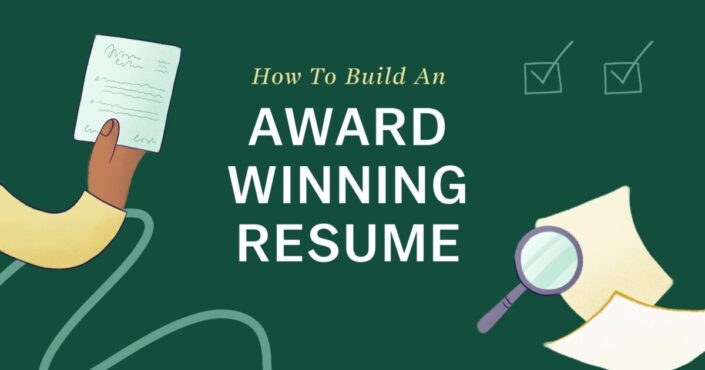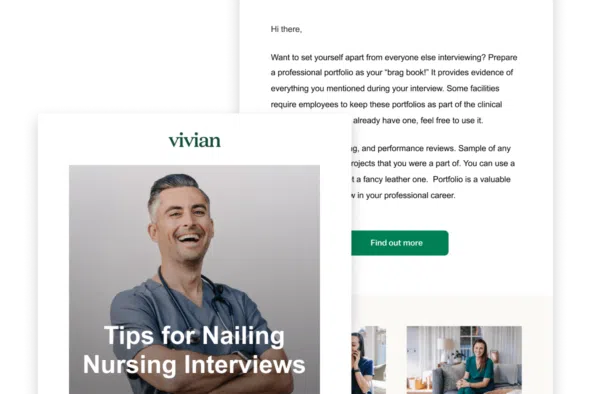Whether you’re looking for your next staff job, your first nursing position or your next travel job, you need a winning resume that’s current and well-formatted. It’s the best way to stand out, get the hiring manager’s attention and give the facility a quick overview of why they should hire you.
Hosted by experienced Vivian staff RNs Rachel Norton and Audra Williams, our webinar takes an in-depth, section-by-section look at how to write a resume that gets noticed.
In this webinar, you’ll learn:
- Resume Formatting Basics
- Understanding Application Tracking Systems
- 5 Healthcare Resume Don’ts
- What Do Hiring Managers Truly Want?
Watch the full webinar video here or check out the recap below.
The How to Build a Winning Resume webinar covers a wide range of resume-writing tips. Topics include how to list travel nurse experience, deal with gaps in your work history, spotlight a promotion, highlight limited job experience as a new grad and tailor your resume to the job you’re seeking.
Be sure to view the last half of the video for an informative Q&A session where Rachel and Audra answer real-time questions from actual nurses building their resumes.
Resume Formatting Basics
You’ve got 5-10 seconds to capture the attention of the talent acquisition expert scanning your resume. First and foremost, hiring teams want to see your name, location and contact information. Including your full address is optional, but you should list your home city and state. Make sure you include your telephone number and a professional email address.
Following this information comes a short summary, sometimes called the “objective.” For the summary, you need to include years of experience, most recent setting and a couple of strong action verbs to qualify your experience and the position you’re seeking. Tailor your summary to match the job you’re applying for, and it will stand out. The goal is to catch the recruiter’s attention so they keep reading.
Use the summary to quantify yourself and state what you’re seeking. The objective for your employment should be clear so guesswork is minimized from the recruiter’s perspective. In addition, automated resume scanners are more likely to send a well-written resume to the recruiter.
Listing Employment History
After the summary, begin listing your employment history. Start with your most recent position and list at least the last seven years of positions held. Include the hospital/facility name, location, job title and dates of employment.
For each role, include 3-6 bullet points showing hard skills and soft skills that relate to the job opportunity. Hard skills are acquired, learned skills, and soft skills are the interpersonal traits that make you a good individual to hire.
For example, if you’re applying for a Cardiac Care Unit and you know how to manage a post-CABG patient, list that in your bullet points. This is a hard skill relevant to the job for which you’re applying. If you’re applying for an Oncology position and have experience handling and administering chemotherapy, add these skills.
You should include any skills you have from past positions that will be used in the new role. Use the role’s job description as a guide for customizing the skills listed on your resume.
Soft skills show who you are and what value you can bring to the role. In the healthcare world, being reliable and a team player are desirable skills, and good communication skills are valued in all positions. Effective time management in the busy healthcare environment is also something to brag about. It’s okay to use powerful words to describe your soft skills and what you bring to the organization.
Customizing Your Resume
Tailor your resume for the job you’re seeking. If it’s a non-clinical role, present a resume that reflects that; the opposite is true if you’re seeking a clinical role. Try opening your resume in one window and the job posting in another, side by side on your monitor. Incorporate the same descriptive words from the job posting into your resume, along with the qualifications the employer is seeking.
Yes, this means you need multiple resumes for multiple applications. However, taking the time to do this important step during the application process will pay off in the end.
When writing out your traits, try to avoid using vague statements such as “I’m driven,” “I’m a hard worker,” or “I’m a team player.” Many applicants throw out these statements, but when pressed further, they often can’t provide specific instances or situations.
Recruiters like to see specific examples, such as, “I would pick up additional shifts at my last job so that patient care wasn’t compromised,” or “I stayed available and helpful with extra tasks at end of shift,” etc. In other words, when asked, you need to be able to give situational contexts to any “I” statements.
Using action verbs to describe your skills, experience and accomplishments is another great resource for resume building. Choose words that are meaningful and stand out. Hiring teams review hundreds of resumes daily, so they will notice if you take the time to add the right descriptive words to your resume.
Including Education and Achievements
The next sections should include your education, certifications and the licenses you hold. For your education, list the institution, the degree achieved, and the date awarded. Add your active license and certifications, and if applicable, add the expiration date. If you want to list additional skills, this is the place to include them.
Lastly, add your accomplishments, volunteer work, community involvement and achievements. Have you ever received a Daisy Award? Taken classes to become a preceptor? Are you on a Unit Based Committee? Do you volunteer in your community?
Go ahead and list some things you’re proud of. Listing community and volunteer work is optional, but it gives you the opportunity to leave the hiring manager with an impression of your life outside of work.

Understanding Application Tracking Systems
An Application Tracking System (ATS) is an AI-based platform designed to make the application process easier for hiring teams. It’s programmed specifically for the company and/or health system application process and its key phrases. An ATS is also equipped with a parser that can rank candidates by how well their resume matches the job among the pool of applicants received.
Each job listed has a job code and description. The ATS is programmed to scan electronic resumes and pass along those that best fit the job description. The fact that the ATS can be specialized and highly specific shows the importance of resume formatting and tailoring your resume to the job you’re looking to land.
You may think, “Well, they just have to read it, and they’ll find what they’re looking for.” But in fact, the ATS system will reject 75% of qualified applicant resumes and miss great candidates that simply don’t use the keywords, formatting and layout to satisfy the predetermined system requirements.
Your resume needs to be saved as a .pdf, .docx or .doc file for the ATS to be able to read and scan it. Avoid adding large images or tables. The ATS can have a difficult time locating the text and could discard your resume if there are distracting factors. Tables can hide the text from the system, and all your hard work might get rejected by the ATS.
We can’t stress enough that it’s vital to optimize your resume to match the job for which you’re applying. You’ll thank yourself later when you secure that perfect job opportunity that takes your career to the next level.
5 Healthcare Resume Don’ts
Now that you have a good idea of how to format your resume, what are the things you should make sure not to do? Here are some of the top mistakes that can make your resume end up in the trash bin.
Don’t let your resume have:
- Spelling errors. Proofread your resume, use a spell checker/grammar checker and have someone else review it for errors. Spelling mistakes look unpolished and unprofessional.
- Sloppy paragraphs. Don’t try to put too much information into a paragraph. Poor formatting makes your resume hard to read and digest. Use a clear bulleted structure throughout to keep it looking clean.
- Distracting formatting. Columns are hard to read at a glance, and tables can be skipped over by an ATS. Steer clear of graphic elements and photos that take away from the focus of your resume – your experience.
- Vague statements. List out specific skills, not general ones. Saying “Administer medication and treatment” is an expected skill all healthcare professionals should have. Tailor this information to highlight the specific meds, equipment and treatment plans you’re experienced in to show you’re qualified for the job for which you’re applying.
- Unprofessional jargon or emojis. Your professional resume is not the place for them. Make your resume stand out so you can be considered as a qualified applicant for the role.
What Do Hiring Managers Truly Want?
This is the main reason we make resumes, right? To get noticed and hired by the managers.
So, what do they really want? They want someone who fits the job and fits their team. They want to add a quality team member to their staff and find someone who works well with others and delivers high-quality care. If you’re sure you’re that person, your resume needs to show that.
It can be challenging to describe your interpersonal skills adequately, but it’s necessary. If you have confidence in your resume, you’ll have confidence in your interview and secure the job. Healthcare professionals are accustomed to putting others first, and this can pose a challenge when it comes to talking about the value you bring. But there are numerous ways to describe your compassion and kindness and those hard-earned skill sets that you possess.
Are you entering a new setting that will require you to learn? For each work history listed, describe what you learned, how you improved and what you accomplished. Demonstrate on paper that you’re motivated to learn, motivated to excel and possess a strong work ethic.
If you’re going to a new organization, check out the job description and add all the qualifications you possess to your resume before submitting it. You can help yourself get noticed quickly by showing that your skills already match what the employer wants.
If you’re a travel nurse, fill up those bullet points with the hard skills and experience you can bring to the table. Skip the back-and-forth by answering up front the questions a recruiter will likely ask. As you list your roles and skills on your resume, this is a great way to remind yourself of all your qualifications and accomplishments prior to an interview.
Be positive, tune up your resume and put your best self forward. With a fresh resume and a great attitude, you’ll be so much closer to landing the role you want.











Good
Thank you so much for the tips! They are very helpful.
My name is Gilson, Brasilian, married have two sons, I’m nurse and my dream is work in the US, bat I need improve my English vocabulary. But in the future this dream will be realized. Hugs
Very useful direction…
Thank you so much
Shanjayanth🌠👍
Excellent tips, thank you!